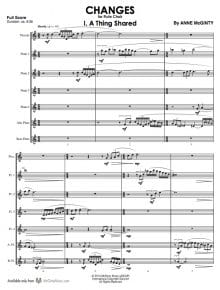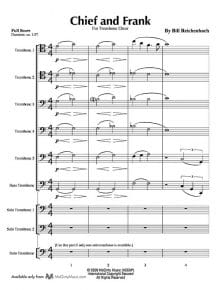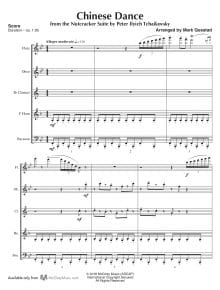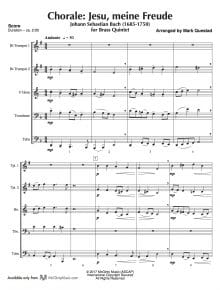Search Music
Music Categories
PDF Download Only
Purchase. Print. Play.
-
Changes – Flute Choir
M.F.K. Fisher, in her book The Gastronomical Me, wrote poignant stories of her life and career based on memorable meals and her experiences with food. When asked by Julia Child why she chose food and hunger for these stories, Mrs. Fisher replied, “When I write about hunger, I am really writing about love and the hunger for it, and warmth, and the richness and fine reality of a hunger satisfied.”
Changes tries to capture that warmth and richness and reality musically. The titles of the three movements are chapter titles from this book, with the music reflecting the many changes that are an inevitable part of living.
The first two movements are both slow and reflective. In the first movement each instrument has something to say and shares it with the others, with the resulting interchanges both bitter and sweet. The second movement, dreamlike as suggested by the title, recalls big dreams as well as little dreams—success, frustration and finally satisfaction. The final movement is playful and at times humorous, with a flurry of notes and amusing syncopations, a drastic change from the first two movements. The ending, with tongue in cheek and consideration of the meter used, is indeed a feminine ending in the classical sense as it does end on the second beat.
The sample score shows the first page of each of the three movements. At this time there is no recording available.
Composer: Anne McGinty
Instrumentation: Piccolo, 4 C Flutes, Alto Flute & Bass Flute
Duration/# of Pages: ca. 9:30 / 48 pages, 8.5″ x 11″
Key: N/A -
Chief and Frank – Trombone Choir
Scored for five trombones, bass trombone and two trombone soloists, this piece is featured on the album “Bill Reichenbach Quartet, Special Edition.” This 16-track, overdubbed trombone chorale is a showcase for Bill’s varied musical skills and was inspired by two men: Chief is Emory Remington, Bill’s legit trombone teacher at Eastman, and Frank is the late Frank Rosolino, the man Bill considers his “greatest jazz influence.”
More than two soloists can be used is performance. If only one soloist is available, there is an optional part that combines the solo lines.
Composer: Bill Reichenbach
Instrumentation: 5 Trombones, Bass Trombone, 2 Trombone soloists (optional part for 1 soloist)
Duration/# of Pages: ca. 1:37 / 17 pages, 8.5″ x 11″
Key: N/A -
Chinese Dance – Woodwind Quintet
The Suite of movements extracted by Tchaikovsky from his ballet music for The Nutcracker was an immediate success. As prevalent as the complete ballet The Nutcracker is today, it is hard to imagine that it took years, and perhaps the staging of George Balanchine, for it to become popular.
Some of the most memorable pieces from the suite are the Characteristic Dances. In Act II of the ballet, these movements are employed to introduce different residents of the “Land of Sweets.” Tchaikovsky’s orchestration makes adept use of wind instrument color. This translates very effectively in arrangements for the woodwind quintet.
The Chinese Dance (Danse chinoise), used to introduce Tea, employs low horn and bassoon in a constant rhythm. This contrasts the famous recurring upper register flute theme.
Composer: Mark Questad
Instrumentation: Flute, Oboe, Clarinet, F Horn & Bassoon
Duration/# of Pages: ca. 1:05 / 10 pages, 8.5″ x 11″
Key: Bb -
Chorale: Jesu, meine Freude – Brass Quintet
With a chorale melody by Johann Crüger and harmonization by Johann Sebastian Bach, this arrangement is a welcome addition to concert programs and church services alike.
Composer: Mark Questad
Instrumentation: 2 Bb Trumpets, F Horn, Trombone & Tuba
Duration/# of Pages: ca. 2:00 / 9 pages, 8.5″ x 11″
Key: Dm




